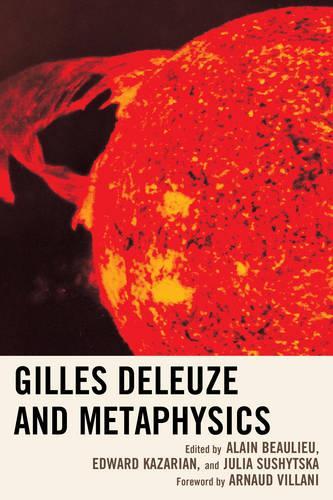
Gilles Deleuze and Metaphysics
(Hardback)
Available Formats
Publishing Details
Gilles Deleuze and Metaphysics
By (Author) Alain Beaulieu
Edited by Edward Kazarian
Edited by Julia Sushytska
Foreword by Arnauld Villani
Contributions by Alberto Anelli
Contributions by Rocco Gangle
Contributions by Sjoerd van Tuinen
Contributions by Joshua Ramey
Contributions by Daniel Whistler
Contributions by Adrian Switzer
Bloomsbury Publishing PLC
Lexington Books
24th December 2014
United States
Classifications
Professional and Scholarly
Non Fiction
110
Physical Properties
Hardback
266
Width 162mm, Height 238mm, Spine 26mm
531g
Description
Deleuze remains indifferent to the ambient pathos related to the end of metaphysics and compares the undertakings of destruction, overcoming and deconstruction of metaphysics with the gestures of murderers. He considers himself a pure metaphysician, which is rather unique in the contemporary philosophical landscape. What are we to make of this and similar claims What do they mean in light of the effort made during the last several centuries to overcome, overturn, destroy, or deconstruct metaphysics If we consider Deleuzes work more closely, might find him engaging in the kind of thinking that is commonly referred to as metaphysical And if Deleuze is indeed a metaphysician, does this undercut the many insightful contributions of the twentieth century philosophers who dedicate their thought to bringing down Western metaphysical tradition Or does it suggest that there is a sense of metaphysics that should nevertheless be preserved These and similar questions are addressed in this volume by a series of international scholars. The goal of the book is to critically engage an aspect of Deleuzes thought that, for the most part, has been neglected, and to understand better his immanent metaphysics. It also seeks to explore the consequences of such an engagement.
Reviews
Gilles Deleuze famously declared himself to be a "pure metaphysician" in an era when philosophy seemed preoccupied by the theme of overcoming metaphysics. As a consequence, perhaps, we have scarcely begun to explore the implications of the immanent metaphysics that Deleuze developed almost half a century ago. Alain Beaulieu, Edward Kazarian, and Julia Sushytska have here brought together an extraordinary collection of philosophers to explore the complex dimensions of Deleuze's project, from its mathematical roots to its political ramifications. The result is an extremely important volume that opens up new vistas on one of the fundamental aspects of Deleuze's philosophy. -- Daniel W. Smith, Purdue University
Author Bio
Alain Beaulieu is associate professor of Philosophy at Laurentian University. Edward Kazarian teaches in the Philosophy and Religion Studies Department at Rowan University. Julia Sushytska teaches at Pacifica Graduate Institute.
